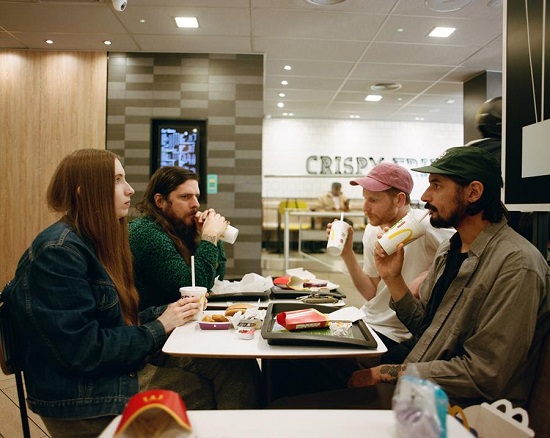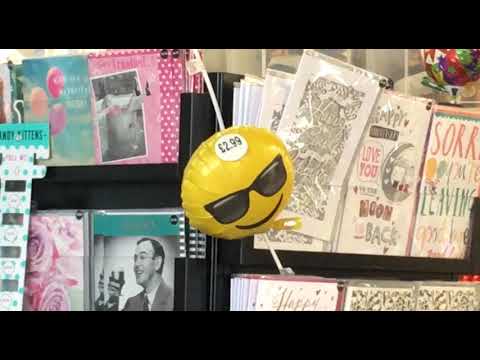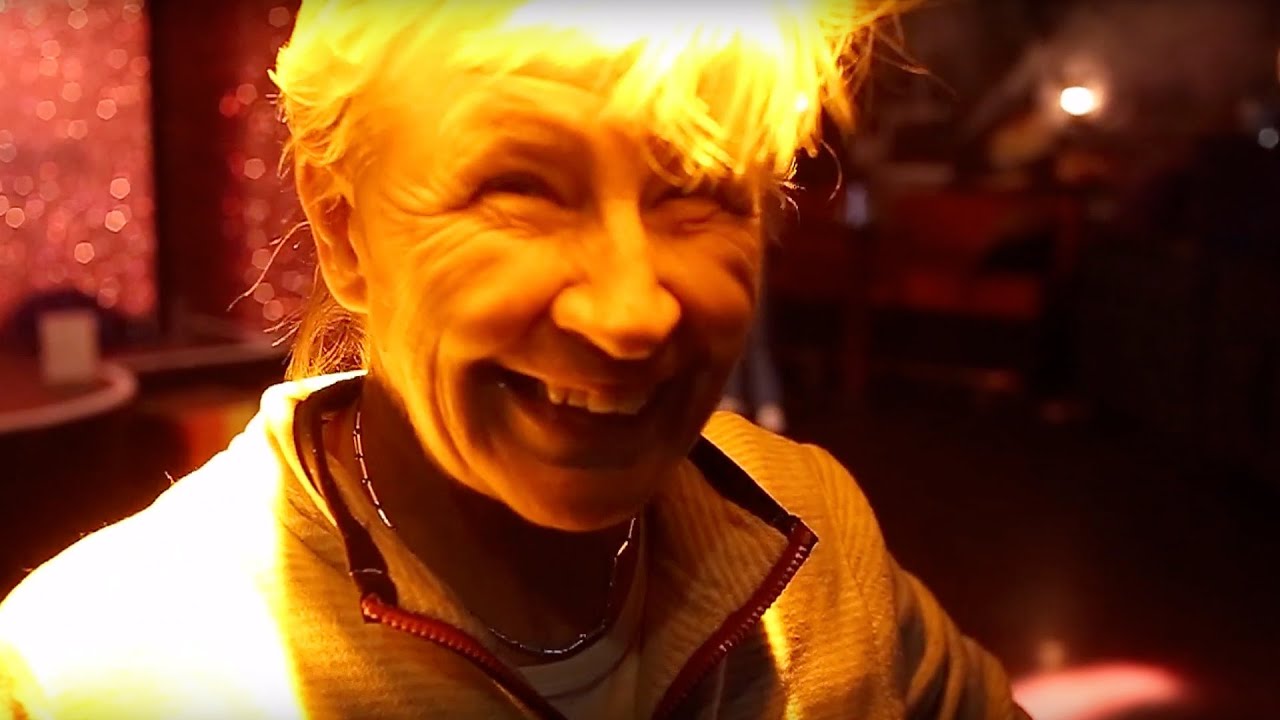All photos by Hanna-Katrina Jędrosz
We meet Dry Cleaning and their dog Stella in a small house in the London suburb of Eltham. From London Bridge it’s a half hour commuter train and a 15-minute bus to the new home of bassist Lewis Maynard’s mum Susan, a powerhouse host and impeccable cook who’s making us pasta for tea. A warm, inviting and cosy semi-detached, it’s 10 minutes from her last place on Boundary Road. Location holds particular sway over the group; their new EP is named Boundary Road Snacks and Drinks, after the amount of snacks and drinks consumed there. “We wanted to put a little flag in the ground, we wanted to say ‘this is where that happened’,” says drummer Nick Buxton.
Maynard, Buxton and guitarist Tom Dowse had been friends and musicians in various projects for a while before they packed in their respective groups and formed Dry Cleaning at a karaoke night. “The previous band me and Nick were in had got to the point where we were trying to bring a choir and a horn section on stage,” laughs Maynard of his time in wonky-slick indie quintet La Shark. “We had to make this one quite simple: let’s never have to do a soundcheck ever again.”
Dowse, who had been performing in hardcore band Sans Pareil (formerly Pariah), was brought in on guitar, and the three went lo-fi, cramming their equipment into Susan’s garage, made even more cramped because it had been double walled owing to a lack of planning permission. “It was such a small space so we were literally on top of each other,” says Buxton. “It was touch and go if Flo could join the band at all because we didn’t know if she could actually fit in the room.”
Florence Shaw, a visual artist, drawing lecturer and picture researcher, was recruited by Dowse, who she knew from art school. She had no prior experience in music, other than two years’ worth of piano as a child, but had incorporated the written word into her art. In a pub, after a friend’s exhibition, Dowse played Shaw some phone recordings of what he, Buxton and Maynard had been working on in the garage. “Something about it seemed to click, those two worlds meeting, Florence and the music.”
Meeting Dowse again at her flat shortly afterwards, “I was frightened,” Shaw remembers. “Not because you were coming to my house, but because you had a guitar. I was like ‘Oh, god, there’s a man with a guitar here!’ I had a book called Fears Of Your Life by Michael Bernard Loggins, where he wrote a list of all the things he was afraid of; so I think it got to the point where I was reading from that while Tom was playing the guitar.”
And so, Shaw entered the garage. “In a way, because we were so near each other, I felt less self-conscious,” she says. “You feel less exposed because they can’t see all of you, being super close is almost like not being seen. I’d never rehearsed anywhere before until the garage so I thought that was normal, I wasn’t ever thinking ‘this is tiny’. When we first rehearsed in the proper music room we use now, I was out of my mind. I thought ‘this is really intense, it’s too much, the lights are really bright, everyone can see me’. I always felt very comfortable in the garage, despite the smallness. Maybe we just need to find another mini room…”
She’s only half-joking. The use of Susan’s garage was part of the plan, in many ways the reason the band sound so enthrallingly taut, so spikey, frantic and engaging. It was a way to push three established musicians back out of their comfort zones. “I’ve never been in a band where I’m the only guitarist, and the bands I’ve been in are always noisy so I was less exposed back then,” remembers Dowse. “I can remember a very early version of ‘Goodnight’ where I was playing quite strange reversed octave chords, because my favourite kind of hardcore is that really grindy stuff with strange octaves, bands like Pg. 99 and Orchid, I was trying to do that in an indie way. These guys were like, can you not always put the distortion on? Can you do less? It took my playing to a different level, having to start pulling those chords apart.”

“There was a spot in the garage where you said ‘don’t stand there, because you’ll get electrocuted,” remembers Shaw. “I suppose that brought some tension to it…” She laughs, but tension is perhaps what’s most crucial to the way Dry Cleaning sound. It’s all over her writing, songs constructed of disparate phrases from all manner of sources, then juxtaposed thrillingly and jarringly against each other. “The longer we go on like this the more burnt the dinner will be, Paula / I found a pretty plastic indicator lens on the walk to your flat / I could give it to you as a gift. But oh yeah, you collect metal not plastic, it’s me who collects plastic / Haha it wasn’t a snake after all, phew! It was just a pile of mushrooms growing in the shape of a snake,” she freewheels on ‘New Job’. Yet they’re all delivered in the same direct and conversational tone, the boundaries between these many clashing voices blurred and smothered by Shaw’s direct and deliberate voice.
There’s tension again between Shaw and the ceaseless grind of guitar, bass and drums behind her, a combination of extreme focus and the lighter touch of a band quite clearly enjoying themselves that almost certainly comes from their time in the garage. It was there that they wrote and recorded their first two EPs, August’’s excellent Sweet Princess and the even better Boundary Road…., released this week.
Shaw has a keen interest in language, especially the particularly close kind of weirdness that can occur in its most mundane forms, like advertising jargon and greetings cards. “There’s something really interesting about things written from a marketing perspective or written to a template, and how that makes up so much of what you actually read,” she says. “It tells you a lot about how people’s brains work. It’s that thing of ‘how do you write something that’s tantalising, and makes you want to know more, and doesn’t give you enough information, and is still a bit mysterious?’ I find that really compelling, I think so much writing on the internet is like that, or the opposite of that where there’s way too much information, YouTubers unboxing something for 50 minutes; you think ‘My god! I want less!’ Have you seen that video ‘all my pets’? It’s a girl showing off all her pets, she’s got like 80 pets. You’re intrigued for like 10 pets. That’s my pet threshold.”
The lyrics to ‘Goodnight’, the first song on their first EP, come from a selection of YouTube comments culled from an Aphex Twin YouTube binge, a particularly rich arena for witterings both inspired and insane. “During what was probably the longest two and a half months of my life after a near death experience, I could not sleep. I was on edge at all times and the only thing that kept me going was Saw 2,” comes the first. Then, without a shift in voice, we’re in the midst of another. “My cat died three months ago at 17 years old. When this song plays I can remember the good old days when I was a kid how we played together with my cat at home alone with my brother and all the good days I had with her…goodnight sweet princess.” Then again: “She said have you ever spat cum onto the carpet of a Travelodge?”

“YouTube comments are always weirdly specific,” Shaw continues. “Ambient music especially has a lot of very interesting comments, people get really deep, and it’s interesting what happens when the tone and nuance of what they’re saying is completely stripped away and how much that does not translate. You’ll read something and have no idea if it’s a joke or sarcasm, or if it’s not translated internationally.”
Her vocals have been called deadpan and laconic, but she seems reluctant to embrace words that would so neatly define a style that leaves plenty of mystery about whose voice is whose. Does she really love Meghan Markle so wholeheartedly as standout single ‘Magic Of Meghan’ expresses? Is it the fawning royalist adoration it first appears, or is there a hint of sarcasm when she drawls about earrings to empower women, and “Just what England needs”? Is it something more complex than that? Or perhaps even something simpler? On ‘Goodnight’, is she just reading out that array of clashing online comments, or is she inhabiting them? It’s thrilling that you can’t tell either way. “It wasn’t really a conscious decision, but looking back that’s the reason why I made it, for want of a better word, deadpan,” Shaw says. “I wanted it to not be obvious, for people to ask a question like that. I think it’s interesting to not know things. I think lots of things are really cut and dried and packaged in a way where there’s no discussion to be had about what the songs are about, who’s singing, it’s just totally a consumable product in a short space of time. It’s nice to make things a bit unknowable.”
Now that Susan has moved house, Dry Cleaning no longer have that space and use a paid rehearsal room, ironically the biggest in that building. “One thing that’s massively changed,” says Dowse, “and is something we’re doing our best to counteract, is that [in the garage] we didn’t have to pressurise anything. The practise space isn’t as hospitable, it’s not meant for relaxing. We’d jam for about 45 minutes then sit down for about two hours and play FIFA watch TV and, as you’re about to find out, eat.”
As Susan fills the table with humongous plates of incredible pasta, lashings of cheesy garlic bread and hefty bottles of beer and wine, the band grin with memories of those early days. “One band practise we did, Lewis was playing the story mode on FIFA and his player got signed for Arsenal, but there were contract talks about him going to LA Galaxy,” Dowse recalls, as he runs through what was a typical day’s ‘work’. “Then we were trying to have a jam but I’d keep stopping and say like ‘I don’t think you should sign man, it’s a step backwards.’ We had to go back to the game and sort it out because we couldn’t stop thinking about it. He did sign for LA Galaxy, and he had a fucking shit time. Then there was a rumour he could go to Madrid, and then dinner turned up, and then you’re like, ‘well, that’s practise sorted!”
Those days are gone, however, and the band are in that massive rehearsal room. Their new EP Boundary Road Snacks and Drinks feels like it was named as a fond farewell. Though they’re taking lessons with them to adjust to the larger space – booking longer than they need so they can fit in plenty of relaxation time – it’s a progression that in terms of their music may eventually feel welcome. They’re sounding bigger, they say, as they work on their debut album, thanks both to this new space (and the volume it allows) and growing experience. With this latest EP, perhaps we too must say goodbye to the garage, and the scrappy, organic sound produced by Dry Cleaning therein. But what comes next, given this band’s artfulness, intelligence and intent, will surely be worth following.




